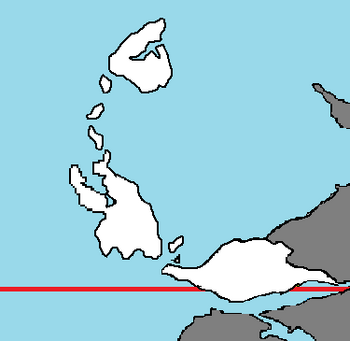Ruskayn
Federation of Ruskayn | |
|---|---|
|
Flag | |
| Motto: Gladium Pretium Nostrum | |
| Anthem: Pride of the Bluelanders | |
 | |
| Capital | Forgeheim |
| Demonym(s) | Ruskaynian |
| Population | |
• Estimate | 32,290,000 |
| Date format | mm-dd-yyyy |
| Driving side | right |
The Federation of Ruskayn, most commonly known as Ruskayn is an archipelagic state located on the continent of Euronia in the Coalition of Crown Albatross. It shares maritime borders with Rio Palito and Zamastan. Situated between the Hapson Sea and the Nalau Sea, it is renowned for its rich history, unique tropical geography, and thriving culture. It also holds dependency status over the Conwin Isles off the coast of Greland. Historically, the people of Ruskayn have been known for their work as mercenaries for foreign nations, notably in the 1871-75 Parabocan War alongside Chanchajillan forces aiding Zamastan from invading Parabocan forces, and the massively encompassing World War (1949-1954).
The economy of Ruskayn is primarily situated around their services for other nations, including ship-building, weapons manufacturing, and paid-manual works. Domestically, they utilize natural resources. Ruskayn is naturally rich in lumber, copper, various ores, as well as oil, which make up their highest exports alongside weapons, military technology, and combat vehicles. The thriving Ruskaynian economy is largely based off of their proud tradition of training Ruskaynian soldiers and then hiring them out as mercenaries to other nations. This practice, although condemned by some in the international community, has been used to great effect by nations such as Avergnon and Zamastan. The recent involvement of Ruskaynian forces in the 2020 War in Vulkaria has shed some favorable light on the practice, however, and military analysts are predicting a rise in the hiring of Ruskaynian mercenary forces.
Historically, Ruskayn has had little effect on the world as a whole, but it has recently begun to gain attention as its economy booms and its mercenary forces are used to greater extent. Some say Ruskayn has its eyes on a position of high authority in the C.C.A., but Ruskaynian government officials have denied this repeatedly.
Etymology
The origin of the nation of Ruskayn's name is technically unknown, but popular opinion states that it originated from the combined names of the Bluelander clan chiefs that led the conquest of the islands: Rusk MacRath and Aynidh Bruin.
History
Pre-Discovery
Traditionally, Ruskayn is believed to have once been inhabited by a people group known as the Corites. Historic record shows they warred with the Kespari people. When the first Bluelander clans landed in what is now Ruskayn, it is believed that the Corites were either assimilated into their ranks, killed off, or driven to escape to Kespar or other nearby civilizations.
Bluelander Exodus
The Bluelanders were a fiercely independent collection of clans of Cadair Cymry natives who fled Cadair during the Prydanian massacre of the Cymry people. Oral tradition states that the MacRath and Bruin clans lead the rest of the Bluelanders in a harrowing journey across land and sea to reach the unclaimed islands that now make up Ruskayn. It is believed that around 30 Bluelander longships set out across the Olympic Ocean, but only 14 of the ships are confirmed to have successfully reached what would become Ruskayn.
Bluelander Conquest
Under the leadership of the MacRaths and Bruins, Bluelanders claimed the northern island, which they named Canaigh. Before long they spread down to the other islands. Several of the Corite tribes joined forces with the Bluelanders, including the Tribe of the Blind Snake and the Children of the Light Fist, among others. The majority of the tribes attempted to fight back against the Bluelander invasion, however, and were eventually pushed back onto the Kespar peninsula, where it is believed most of them were enslaved by the Kespari people. The whole Bluelander conquest of the atoll is believed to have taken somewhere between five and ten years. Once the Bluelanders had finished their campaign, the clans all split the islands between themselves, and went their separate ways. They still kept friendly contact and the clans all met annualy on one of the central islands, where they would hold a weeklong feast and celebration, complete with all sorts of competitions of physical prowess.
